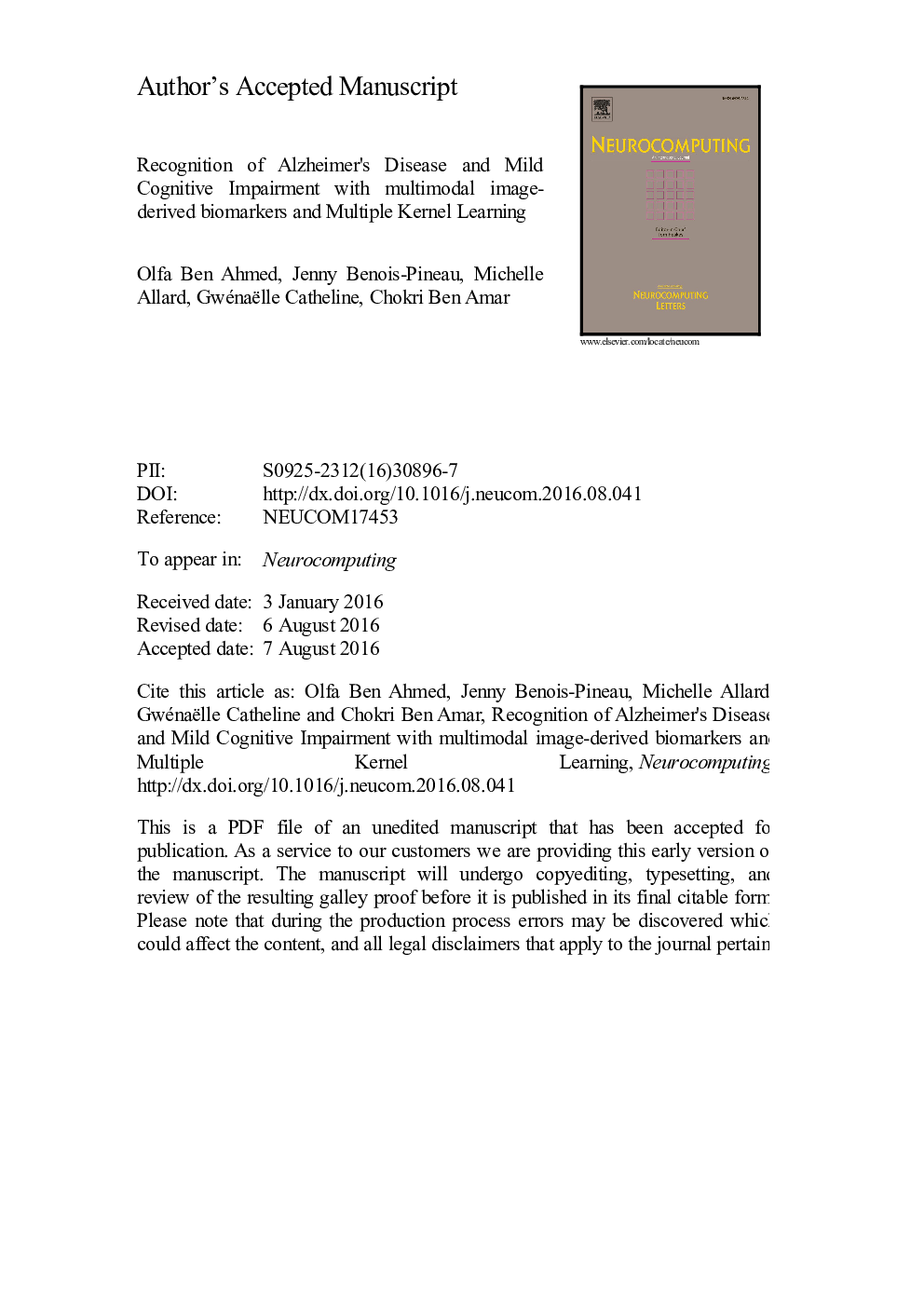| کد مقاله | کد نشریه | سال انتشار | مقاله انگلیسی | نسخه تمام متن |
|---|---|---|---|---|
| 4948094 | 1439607 | 2017 | 35 صفحه PDF | دانلود رایگان |
عنوان انگلیسی مقاله ISI
Recognition of Alzheimer's disease and Mild Cognitive Impairment with multimodal image-derived biomarkers and Multiple Kernel Learning
ترجمه فارسی عنوان
تشخیص بیماری آلزایمر و اختلال شناختی خفیف با بیومارکرهای مشتق شده از تصویر و یادگیری چند هسته ای
دانلود مقاله + سفارش ترجمه
دانلود مقاله ISI انگلیسی
رایگان برای ایرانیان
کلمات کلیدی
موضوعات مرتبط
مهندسی و علوم پایه
مهندسی کامپیوتر
هوش مصنوعی
چکیده انگلیسی
Computer-Aided Diagnosis (CAD) of Alzheimer's disease (AD) has drawn the attention of computer vision research community over the last few years. Several attempts have been made to adapt pattern recognition approaches to specific neuroimaging data such as Structural MRI (sMRI) for early AD diagnosis. One strategy is to boost the discrimination power of such approaches by integrating complementary imaging modalities in a single learning framework. Diffusion Tensor Imaging (DTI) is a new and promising modality giving complementary information to the anatomical MRI. However, including relevant DTI information from such modality is a challenging problem. In this paper, we propose to extract local image-derived biomarkers from DTI and sMRI to construct multimodal AD signatures. To assess the relevance of such modalities as well as to optimize the classifier, we integrate complementary information using a Multiple Kernel Learning (MKL) framework for AD subjects recognition. To evaluate our method, we perform experiments on a subset from the Alzheimer's Disease Neuroimaging Initiative (ADNI) dataset. Both T1-weighted MRI and Mean Diffusivity (MD) maps from the DTI modality of 45 AD patients, 52 Normal Control (NC) and 58 Mild Cognitive Impairment (MCI) subjects have been used. The obtained results indicate that our multimodal approach yields significant improvement in accuracy over using each single modality independently. The classification accuracies obtained by the proposed method are 90.2%, 79.42% and 76.63% for respectively AD vs. NC, MCI vs. NC and AD vs. MCI binary classification problems. For the MCI classification problem, the proposed fusion framework leads to an average increase about at least 9% for the accuracy, 5% for the specificity and 15% for the sensitivity.
ناشر
Database: Elsevier - ScienceDirect (ساینس دایرکت)
Journal: Neurocomputing - Volume 220, 12 January 2017, Pages 98-110
Journal: Neurocomputing - Volume 220, 12 January 2017, Pages 98-110
نویسندگان
Olfa Ben Ahmed, Jenny Benois-Pineau, Michelle Allard, Gwénaëlle Catheline, Chokri Ben Amar, For the Alzheimer's Disease Neuroimaging Initiative For the Alzheimer's Disease Neuroimaging Initiative,
